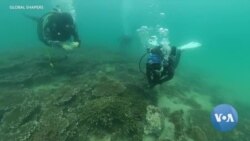Racing against climate change to save the world’s coral reefs.
Welcome to VOA Asia Weekly. I'm Chris Casquejo in Washington. That story is just ahead, but first, making headlines:
''I don't know for a fact what happened, but I'm not surprised."
U.S. President Joe Biden says he doesn't know what happened regarding a plane crash possibly involving Russia’s Wagner mercenary group leader Yevgeny Prigozhin, but "is not surprised." Emergency officials said the plane with 10 people aboard crashed Wednesday as it flew from Moscow to St. Petersburg.
Satellite images of Triton Island reveal a new structure that experts believe is part of China's military expansion meant to support its maritime claims in the South China Sea. The images have sparked protests from the U.S., Vietnam and Taiwan. Satellite photos taken of Triton in August by Planet Labs PBC imaging service that VOA obtained last week show what appears to be a long structure jutting out toward the east. One expert said it likely was a levee. It wasn’t visible in photos taken in March.
“In accordance with the international and Philippine national law, you are within Philippines’ exclusive economic zone.”
The Philippines said a resupply mission had reached a remote outpost in the disputed South China Sea Tuesday, despite what Manila said were attempts by Chinese vessels to block the boats carrying provisions for Philippine marines.
Thailand’s new prime minister, Srettha Thavisin, received royal assent on Wednesday, a day after he was elected to the post by a joint sitting of both houses of parliament. The developments end months of political uncertainty following the May elections.
U.S. President Joe Biden and first lady Jill Biden on Monday saw firsthand the devastation wrought by flames that ripped through the western part of the Hawaiian island of Maui. Biden promised communities would be rebuilt respecting sacred lands and traditions “the way the people of Maui want to rebuild” --- after the deadliest U.S. wildfire in more than a century.
China is banning imports of Japanese seafood in response to Tokyo discharging treated and diluted radioactive wastewater into the Pacific Ocean. On Thursday, Japan started releasing the water from the damaged Fukushima Daiichi nuclear power plant.
With warming ocean waters threatening much of the world’s coral reefs, some ecologists are using simple technology to help restore them. VOA’s Julie Taboh has more.
Coral reefs are in danger.
Rapidly warming ocean waters is the main reason they’re dying in record numbers.
This disturbing trend has motivated some people to act.
Joanie Kleypas is a coral reef scientist and director of Raising Coral Costa Rica.
“I've worked on coral reefs for a long time, mainly as a scientist. And I got really tired of telling people how bad it’s going to be, and decided to say, ‘What can we do to make the reefs more resilient?’ And that's why we started this project.”
Their project involves taking small pieces of coral from the wild and growing them in underwater nurseries for replanting on the reefs.
The team uses simple technology to keep track of where the coral fragments come from, to find the most resilient.
“We're also distributing our corals to many more locations with things like temperature sensors and monitoring just to make sure we are gathering as much information as we can about where to put them in the future.”
Restoration projects such as these are essential. By some estimates, the world has already lost 50% of its corals in the past 30 years due to global warming.
If corals die, their disappearance will have a catastrophic impact on life both in and out of the ocean.
Coral reefs protect our shorelines, maintain biodiversity in the water, and are essential to marine life.
Another group that’s helping to restore coral is Archireef, a climate technology company that’s developed 3D-printed terracotta “reef tiles” that can be embedded into strategic areas of the ocean floor as a substrate to help grow new coral.
“We place them with divers, we place them at the bottom of the ocean. And then we place coral fragments on top.”
One of the benefits of the lightweight tiles is they can be moved to deeper, cooler waters as needed.
“A diver can essentially deploy up to about 40 square meters in a single day, by themselves.”
That versatility has helped both projects achieve success as ocean temperatures continue to rise.
In the words of renowned American oceanographer Sylvia Earle, “The corals need the fish, the fish need the corals; if you take the fish away, the corals die, take the corals away, the fish die.”
Julie Taboh, VOA News.
Visit voanews.com for the most up-to-date stories.
Thanks for watching VOA Asia Weekly. I’m Chris Casquejo.











